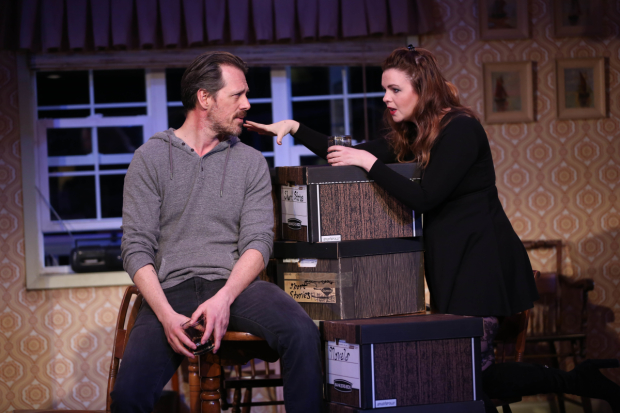Can You Forgive Her?

(© Carol Rosegg)
"Everything she wrote is about my dad leaving her," says Graham (Darren Pettie), pointing to the stacks of file boxes holding his deceased mother's literary non-masterpieces. "She was pretty much a one-topic writer."
"All great writers are one-topic writers," responds almost-poetry Ph.D. Miranda (Amber Tamblyn).
The self-referential moment by playwright Gina Gionfriddo winks at (or moderates the expectations of) fans of her Pulitzer Prize-nominated plays Becky Shaw and Rapture, Blister, Burn as they settle into her latest work, Can You Forgive Her?, directed by Peter DuBois in its New York debut at the Vineyard Theatre.
Gionfriddo does spend the play returning to familiar themes: the power dynamics of dysfunctional relationships, the ways in which women claim agency over their lives, and the personal mythologies we cling to in order to make sense of our own narratives. So what happens when you try to weave all of that into a ghost story? The result in Can You Forgive Her? is not entirely cohesive, but it does give Gionfriddo space to break new ground on the topics she writes so well.
Like all good ghost stories, this one is set on Halloween night. Tanya is delivering her much-older, soon-to-be fiancé Graham a thoroughly rehearsed ultimatum: Get a job or get lost (Ella Dershowitz playing Tanya with the emotional sterility of her favorite self-help book). Graham claims to be getting his bearings since the death of his mother six months ago, spending his time lounging around the New Jersey beach house where he grew up, and where we also meet Tanya and Graham mid-confrontation (Allen Moyer designs a 1970s-inspired living space that looks like the must of neglect). But Tanya, a 27-year-old single mother and underpaid bartender (who at this unfortunate moment is costumed as a medieval serving wench in preparation for an evening of Halloween-night work), can't afford to take any more risks. She has big dreams of middle-class stability and won't let another man stand in the way. Graham eventually concedes to her plea, agreeing to fix up the beach house for rental income, and Tanya celebrates her future of humdrum bliss.
If that misguided assumption about middle-class nirvana isn't enough of a setup for a horror plot, in walks Miranda, the woman Graham has agreed to hide at his house after she provoked death threats from the man who accompanied her to Tanya's bar that evening (a scene we don't witness ourselves). She's dressed in a revealing black getup — supposedly a "sexy witch" (another Halloween masterpiece designed by Jessica Pabst) — but she's more like the devil to Tanya's angel, tempting Graham in ways that could derail all of his fiancée's sensible plans.
If modest pragmatism describes Tanya's approach to life, Miranda's is the polar opposite — hence her extensive studies in the impractical field of literature that landed her deep in debt with no way to pay it off (Tanya, on the other hand, is headed for a career in accounting). Tamblyn makes an outstanding off-Broadway debut as this woman-child who has more in common with the actual storm of Shakespeare's Tempest than with its protagonist, who inspired her name. She makes sense of Miranda's illogical combination of intellect and immaturity, and is a perfect elixir for Graham, whose stunted inner child Pettie subtly suppresses behind the veneer of a capable adult. As Tanya says, "There are people who intoxicate us, and there are people who nourish us," and Tamblyn is intoxicating — particularly for Graham as she grants him permission to feel the world is indebted to him, rather than the other, more burdensome alternative.
Unfortunately, despite the glowing jack-o-lanterns that punctuate her entrance, nothing particularly haunting happens for some time following Miranda's arrival. We even forget the supposed stakes of the situation — namely, that a man is roaming the streets looking to kill her. We're instead left with a regular back-and-forth between two increasingly intoxicated people who have nothing better to do than trade life stories. The exchange is perfectly engaging and shows off Gionfriddo's sharp wit, but it slumps back into safe and grounded territory when we've been teased with something other-worldly.
The only haunting parts of this whiskey-soaked conversation are the characters in Graham and Miranda's personal tales. Graham's tortured mother's every living thought literally stares him in the face day in and day out, paralyzing him with a guilt that's led him to hoard this last piece of her legacy. Miranda's "sad mom" and absent father saga similarly looms like a specter over her current behavior — not the least of which includes taking up with an older man named David (a father of two) for reasons of questionable morality and legality (Frank Wood makes a late appearance as David, delivering a perfectly stone-faced performance at which Tamblyn can spew all of Miranda's pent-up daddy issues in a hilarious display of teenage melodrama).
Sexual entanglements are all we see, but the real relationships at play are the ones between parents and the people who forever remain their "children." And Gionfriddo raises interesting questions about the rules that govern these tangled webs. What does a parent owe a child? What does a child owe a parent? Does anyone or anything in this world owe us anything? Miranda seems to think so. Although she is the reason this evening has devolved into a Hitchcock film, so perhaps her dramatic worldview is not one to emulate (the story does finally come to a chilling climax complete with spooky shadows and lighting by Russell H. Champa). Then again, if all of our misguided beliefs and behaviors are moved by the ghosts of our mothers, perhaps the only productive question to ask is, Can you forgive her?











